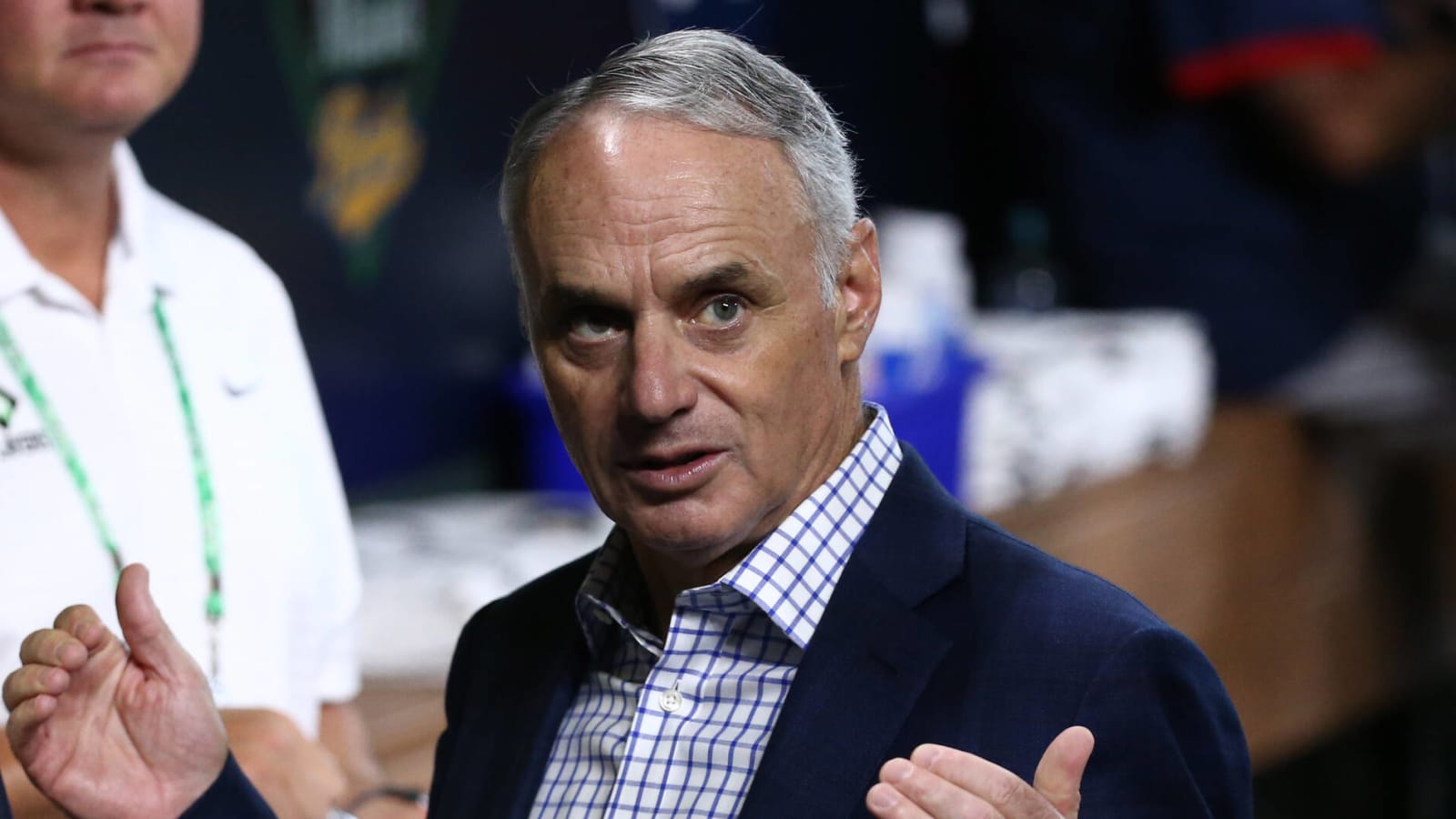
Major League Baseball commissioner Rob Manfred met with the media for about 30 minutes Thursday morning as the quarterly owners’ meetings drew to a close, discussing the status of the ongoing labor dispute with the MLB Players Association. Among the more concrete takeaways, Manfred said that the league has “agreed” both to the implementation of a universal designated hitter and the elimination of draft-pick compensation for free agents who reject qualifying offers.
However, as MLBTR’s Tim Dierkes reports (Twitter links), the use of “agreed” is a bit misleading. The two parties have not reached a formal agreement on either issue. Rather, Manfred’s use of “agreed” merely indicates that both the universal DH and elimination of draft-pick compensation were included as components of a broader proposal put forth by MLB some time ago.
Still, with regard to the universal designated hitter, this is one of the most concrete indicators of its likely implementation. Both parties, after all, have in the past shown a desire to add a DH to the National League. For the players, this creates another spot in 15 lineups and could create a handful of jobs for free agents. For teams, this all but eliminates the risk of pitchers being injured at the plate and on the bases. Because of that mutual interest, though, the league’s desire to frame the universal DH as something of a concession is somewhat questionable. It’s not clear the union will perceive it as a concession.
With regard to the elimination of pick compensation, Dierkes reports that the league’s proposal instead would award draft picks to teams for losing free agents, based on the quality of player, with no offer of any sort required. That raises issues on how to specifically determine that player’s value, however, and the MLBPA likely harbors concern that by giving teams a pick for losing a free agent, the league is actually disincentivizing clubs from re-signing some of their own players.
Beyond those two more concrete elements of his side’s recent proposal, Manfred offered little in the way of definitive statements. Asked about the status of spring training (i.e. whether it will be delayed), the commissioner replied that the “status of spring training is no change right now.”
We’re only a week out from the original report date for players and have, to this point, seen no meaningful progress in negotiations between the league and union. A delayed spring training feels like a foregone conclusion, but Manfred at least kicked the can down the road a couple days on any such formal declaration, suggesting that the decision was contingent on how Saturday’s meeting with the MLBPA plays out. That said, while Manfred didn’t explicitly state that spring training will be delayed, he addressed the possibility, acknowledging that the three-week ramp up period to the pandemic-shortened 2020 season was insufficient.
“The injury data shows that,” Manfred said of 2020’s training period. “We’d like to be [at] 28 [days] — we think four weeks makes sense.” A four-week spring training would still fall a good ways shy of the typical six-week period, but the extra week of build-up time in that theoretical scenario would prove beneficial to players, particularly to starting pitchers.
Manfred declared himself an optimist, stating more broadly that he believes the two sides will reach an agreement in time for the regular season to begin, as planned, on March 31. Missing regular-season games would be a “disastrous outcome to this industry,” Manfred said, adding that MLB is “committed to reaching an agreement to avoid that.”
Upon being asked about the league making just one proposal in the 10 weeks since implementing the lockout, Manfred demurred and stated that “phones work two ways,” painting the lack of meaningful talks as a two-way street. Whichever side you take in the increasingly ugly battle — and it’s plenty fair if your answer is, “neither!” — it was ownership that locked out the players in, as Manfred stated at the time, an effort to “jumpstart” progress toward a deal. A silent period of more than six weeks followed. It’s plenty defensible to say the union should have been more proactive in instigating talks, but at the very least, the players have spent the past two weeks publicly declaring a desire for daily negotiations.
In one of the more eyebrow-raising moments of the press conference, Manfred was asked whether purchasing an MLB franchise was a “good investment.” He bizarrely implied the contrary, stating that between the purchase price of the team and the money invested into the club on a year-over-year basis, the “return on those investments is below what you’d expect to get in the stock market,” adding that there was greater risk in owning a team. Comments of that nature are sure to further galvanize a union that has repeatedly suggested the league isn’t being genuine or negotiating in good faith.
That term, “good-faith,” is a recurring theme when both sides discuss negotiations, as each indicates that the other is effectively neglecting to operate in such a fashion. For his part, Manfred vowed to make a “good-faith, positive proposal” to the players when the two sides meet Saturday, implying that perhaps this weekend could serve as a turning point.
“One correct move sometimes opens the way to an agreement,” said Manfred. “My view of the world is you always keep looking for that one move that creates that opportunity.”
More must-reads:
- MLB to make next core economics proposal Saturday
- Yankees' Gerrit Cole: MLBPA 'united to protect the integrity of the game' amid MLB lockout
- The 'No. 1 overall pick in the MLB Draft' quiz
Breaking News
Customize Your Newsletter
 +
+
Get the latest news and rumors, customized to your favorite sports and teams. Emailed daily. Always free!

